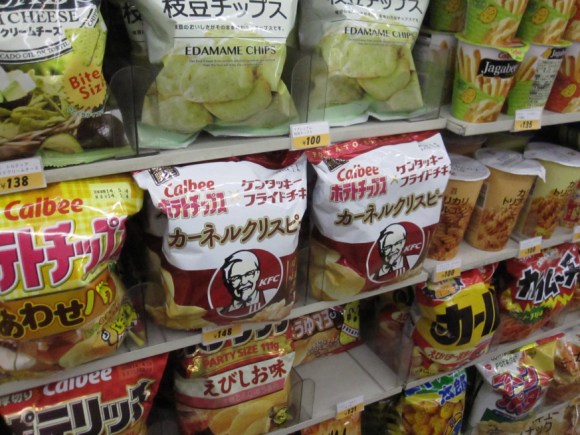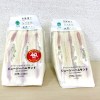Japanese culture is filled with gift giving, and no gift is more common than the omiyage. Usually translated as “souvenir,” omiyage is a bit broader in usage, encompassing all sorts of travel gift situations. Taking a trip somewhere? Make sure to bring back omiyage for your coworkers. Have friends coming from overseas? You might want to give them some omiyage to remember their trip by. And of course, if those same friends offer to show you around their country, it’s only polite to bring them an omiyage as a show of thanks, if you take them up on their offer.
But what kind of Japanese omiyage from Japan is most likely to be a hit with foreigners? Japanese Internet users offered the following suggestions.
The list starts off with the most obvious choice, a folding fan. Sure, it doesn’t get any bonus points for originality, but that’s just because it’s such a tried and true choice. Lightweight and easy to pack, a folding fan is instantly evocative of Japan, plus a real lifesaver for visitors to the country during its humid summer.
Another artistic choice is a furoshiki, a patterned cloth used for wrapping and carrying bundles. The versatile furoshiki can also handle the duties of a tablecloth or tapestry, and many stores which sell them also stock inexpensive hanging frames.
Similarly, you could go with an assortment of washi, paper produced using traditional Japanese techniques. Washi is a bit trickier to find a use for than furoshiki, but the variety of designs and textures available make it a unique and beautiful decorative covering, as well as the paper crafts such as origami.
A less delicate item that instantly says “Japan” is a bokutou, or wooden sword. Be advised, though, that despite what anime and Japanese role-playing games may have told you, few, if any, bokutou have the power to cut through concrete, even if the wielder raises his chi levels first.
However, as these suggestions come from Japanese nationals, it stands that the majority of the suggestions follow the conventional logic in Japan that the best omiyage is something that the receiver can eventually use up, thereby precluding the need to store it permanently in his home.
As a result, food is by far the most common omiyage. Some of the gifts that got the happiest reactions were Japanese takes on Western staples, such as uniquely-flavored potato chips or Kit-Kat varieties.
▼ KFC Potato Chips. Because Japan never stops dreaming.
Of course, Japan also has a rich culinary heritage of its own for gift givers to draw on. One choice is yatsuhashi, a traditional confectionary from Kyoto. The dough used for yatsuhashi is either folded into a triangle, with a dollop of sweet bean paste placed inside, or baked until it has the consistency of a cracker.
Another high class delectable on the list is yubeshi. Made of sticky rice flour and commonly flavored with the Japanese citrus fruit called yuzu, yubeshi has been a popular treat in Japan since the 12th century, and is sliced thinly before eating.
Another pan-generational favorite of Japanese with a sweet tooth is uiro, one of the many variations of the Japanese rice cakes collectively called mochi. Uiro, which comes in flavors such as sweet red beans and green tea, may not be able to match yubeshi’s lengthy history, but it has been around for at least 300 years.
You don’t have to go old-school to find a uniquely Japanese confectionary, either. One commenter related stories he’d heard of the island of Hokkaido’s signature omiyage, the white-chocolate wafers Shiro Koibito, getting a chuckle out of foreigners for its name, which translates as “white lovers.”
▼ All snickering aside, they really are delicious.
Should you need a gift for someone who doesn’t have a sweet tooth, there’s always a nice bottle of sake. Or, if the person you’re shopping for isn’t a drinker, you could go with one Japanese citizen’s unique recommendation of a bottle of yakiniku sauce, like the kind used at Japan’s ubiquitous grill your own meat restaurants.
▼ On one hand, we could get up on our high horse and be offended by the implication that all foreigners like meat. On the other, we really do have some serious steak hankerings right now.
And in the unlikely scenario that you find yourself in need of an omiyage for someone who somehow hates art, sweets, booze, and even delicious, delicious beef? There’s one last suggestion from the list’s contributors, which even follows the protocol of being something the receiver can use up, which at the very least any American will be able to utilize.
“Six bucks.”
Unorthodox? Definitely. But you can’t deny the inherent generosity in sponsoring another person’s choice of five-dollar beer, tip included.
Source: Livedoor
Insert image:RocketNews24


 Pikachu and Kyoto candy maker team up for confectionary collaboration centuries in the making
Pikachu and Kyoto candy maker team up for confectionary collaboration centuries in the making Our search for Kyoto Station’s cheapest souvenir reveals a surprisingly sweet find
Our search for Kyoto Station’s cheapest souvenir reveals a surprisingly sweet find Pokémon and 158-year-old Kyoto sweets shop team up for Pokémon wagashi confectionery line【Pics】
Pokémon and 158-year-old Kyoto sweets shop team up for Pokémon wagashi confectionery line【Pics】  Japanese internet browser cookies are higher quality than some of the browsers themselves 【Pics】
Japanese internet browser cookies are higher quality than some of the browsers themselves 【Pics】 Crepe made with Kyoto sweets and green tea is the perfect treat after a day of temple hopping
Crepe made with Kyoto sweets and green tea is the perfect treat after a day of temple hopping Foreigner’s request for help in Tokyo makes us sad for the state of society
Foreigner’s request for help in Tokyo makes us sad for the state of society Seaside scenery, history, and so many desserts on Yokohama’s Akai Kutsu【Japan Loop Buses】
Seaside scenery, history, and so many desserts on Yokohama’s Akai Kutsu【Japan Loop Buses】 Mikado Coffee is a 76-year-old coffee chain with a major celebrity connection
Mikado Coffee is a 76-year-old coffee chain with a major celebrity connection Japanese ramen restaurants under pressure from new yen banknotes
Japanese ramen restaurants under pressure from new yen banknotes Japan’s summertime towelket pillowcases are even better with the addition of Ghibli stars【Photos】
Japan’s summertime towelket pillowcases are even better with the addition of Ghibli stars【Photos】 Smash Bros. director Sakurai stabs Kirby in the face, has delicious justification for it
Smash Bros. director Sakurai stabs Kirby in the face, has delicious justification for it Does the virgin-killing sweater really kill virgins?【Video】
Does the virgin-killing sweater really kill virgins?【Video】 Hey, Japanese taxi driver! Take us to your favorite restaurant in Tsuruga City!
Hey, Japanese taxi driver! Take us to your favorite restaurant in Tsuruga City! New Japanese convenience store sandwiches feel like they’re out to kill us
New Japanese convenience store sandwiches feel like they’re out to kill us Japanese convenience store fools us with its 40-percent-more sandwich, but in a good way
Japanese convenience store fools us with its 40-percent-more sandwich, but in a good way McDonald’s new Happy Meals offer up cute and practical Sanrio lifestyle goods
McDonald’s new Happy Meals offer up cute and practical Sanrio lifestyle goods French Fries Bread in Tokyo’s Shibuya becomes a hit on social media
French Fries Bread in Tokyo’s Shibuya becomes a hit on social media Studio Ghibli releases new action figures featuring Nausicaä of the Valley of the Wind characters
Studio Ghibli releases new action figures featuring Nausicaä of the Valley of the Wind characters Red light district sushi restaurant in Tokyo shows us just how wrong we were about it
Red light district sushi restaurant in Tokyo shows us just how wrong we were about it New private rooms on Tokaido Shinkansen change the way we travel from Tokyo to Kyoto
New private rooms on Tokaido Shinkansen change the way we travel from Tokyo to Kyoto Tokyo Tsukiji fish market site to be redeveloped with 50,000-seat stadium, hotel, shopping center
Tokyo Tsukiji fish market site to be redeveloped with 50,000-seat stadium, hotel, shopping center Beautiful Ghibli sealing wax kits let you create accessories and elegant letter decorations【Pics】
Beautiful Ghibli sealing wax kits let you create accessories and elegant letter decorations【Pics】 Japanese city loses residents’ personal data, which was on paper being transported on a windy day
Japanese city loses residents’ personal data, which was on paper being transported on a windy day Studio Ghibli releases Kiki’s Delivery Service chocolate cake pouches in Japan
Studio Ghibli releases Kiki’s Delivery Service chocolate cake pouches in Japan New definition of “Japanese whiskey” goes into effect to prevent fakes from fooling overseas buyers
New definition of “Japanese whiskey” goes into effect to prevent fakes from fooling overseas buyers Our Japanese reporter visits Costco in the U.S., finds super American and very Japanese things
Our Japanese reporter visits Costco in the U.S., finds super American and very Japanese things All-you-can-drink Starbucks and amazing views part of Tokyo’s new 170 meter-high sky lounge
All-you-can-drink Starbucks and amazing views part of Tokyo’s new 170 meter-high sky lounge More foreign tourists than ever before in history visited Japan last month
More foreign tourists than ever before in history visited Japan last month New Pokémon cakes let you eat your way through Pikachu and all the Eevee evolutions
New Pokémon cakes let you eat your way through Pikachu and all the Eevee evolutions Disney princesses get official manga makeovers for Manga Princess Cafe opening in Tokyo
Disney princesses get official manga makeovers for Manga Princess Cafe opening in Tokyo Sales of Japan’s most convenient train ticket/shopping payment cards suspended indefinitely
Sales of Japan’s most convenient train ticket/shopping payment cards suspended indefinitely Sold-out Studio Ghibli desktop humidifiers are back so Totoro can help you through the dry season
Sold-out Studio Ghibli desktop humidifiers are back so Totoro can help you through the dry season Japanese government to make first change to romanization spelling rules since the 1950s
Japanese government to make first change to romanization spelling rules since the 1950s Ghibli founders Toshio Suzuki and Hayao Miyazaki contribute to Japanese whisky Totoro label design
Ghibli founders Toshio Suzuki and Hayao Miyazaki contribute to Japanese whisky Totoro label design Doraemon found buried at sea as scene from 1993 anime becomes real life【Photos】
Doraemon found buried at sea as scene from 1993 anime becomes real life【Photos】 Tokyo’s most famous Starbucks is closed
Tokyo’s most famous Starbucks is closed One Piece characters’ nationalities revealed, but fans have mixed opinions
One Piece characters’ nationalities revealed, but fans have mixed opinions We asked a Uniqlo employee what four things we should buy and their suggestions didn’t disappoint
We asked a Uniqlo employee what four things we should buy and their suggestions didn’t disappoint Princesses, fruits, and blacksmiths: Study reveals the 30 most unusual family names in Japan
Princesses, fruits, and blacksmiths: Study reveals the 30 most unusual family names in Japan Japanese student criticised for campaign against excess plastic packaging
Japanese student criticised for campaign against excess plastic packaging Noodles for candy lovers: Gummy Udon arrives just in time for White Day
Noodles for candy lovers: Gummy Udon arrives just in time for White Day We’ve been doing it wrong – Japanese genius shows us how we should all be making sandwiches【Pics】
We’ve been doing it wrong – Japanese genius shows us how we should all be making sandwiches【Pics】 Falling into the sweet life with Japanese convenience stores’ new sweet potato sweets【Taste test】
Falling into the sweet life with Japanese convenience stores’ new sweet potato sweets【Taste test】 New Japanese sweets store sells drinkable red bean paste
New Japanese sweets store sells drinkable red bean paste This Japanese sweets shop specializes in beautiful flower-shaped ohagi rice cakes
This Japanese sweets shop specializes in beautiful flower-shaped ohagi rice cakes Weird Japanese vending machine find gives us unique sweet potato sweets
Weird Japanese vending machine find gives us unique sweet potato sweets Japan’s new old-school Dragon Quest sweets are Slime-like in more ways than one【Taste test】
Japan’s new old-school Dragon Quest sweets are Slime-like in more ways than one【Taste test】 Here’s what a 10,000-yen Sushi Cake from Japan looks like
Here’s what a 10,000-yen Sushi Cake from Japan looks like How to make your own hoshi-imo Japanese dried sweet potato snacks【SoraKitchen】
How to make your own hoshi-imo Japanese dried sweet potato snacks【SoraKitchen】 The Japanese art of making trash containers from old papers
The Japanese art of making trash containers from old papers We crunch into autumn with Starbucks Japan’s new Crispy Sweet Potato Frappuccino【Taste test】
We crunch into autumn with Starbucks Japan’s new Crispy Sweet Potato Frappuccino【Taste test】 Grand Hyatt Tokyo teaming up with artist Takashi Murakami for adorable take-out afternoon tea set
Grand Hyatt Tokyo teaming up with artist Takashi Murakami for adorable take-out afternoon tea set Udon wanna make a mistake – be my Valentine!
Udon wanna make a mistake – be my Valentine! Japanese vending machine is the only one of its kind in Japan, dubbed the “phantom machine”
Japanese vending machine is the only one of its kind in Japan, dubbed the “phantom machine”
Leave a Reply